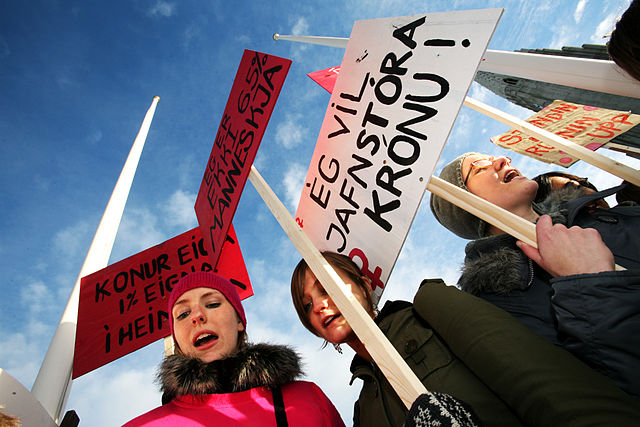Iceland, a country that tops the Global Gender Gap Index for the 12th year in a row is one of the most progressive countries in the world when it comes to women’s empowerment. Can other countries learn from Iceland’s success story?
Eda Doğançay
The success story of Iceland, which sets an example for the whole world with regards to gender equality began in 1980 when Vigdís Finnbogadóttir, the world’s first democratically elected female president, took office.
Today, Iceland is hands down one of the most progressive country in the world when it comes to women’s empowerment.
Iceland tops the Global Gender Gap Index 2021 published by the World Economic Forum (WEF) for the 12th year in a row.
Iceland’s success is not limited to this. It also consistently ranks first in women’s political power and gender-based income gap indices, and boasts over 40 percent of women on the board of directors in companies with more than 50 employees.
In 2018, Iceland introduced the first policy in the world that requires companies and institutions with more than 25 employees to prove that they pay men and women equally for a job of equal value. The policy is implemented through a job evaluation tool called the Equal Wage Management Standard, or simply, the system. If companies show they pay equally for the same positions, they receive certification. Beginning in 2020, certification became a requirement and companies without certification incur a daily fine.
Currently, Iceland has closed 89.2% of its gender gap. If the momentum continues like this, the country will have reached the ideal of ‘equal pay for equal work’ by 2070.
In Iceland, 84.3% of women participate in the workforce and are employed at higher rates than men in professional and technical roles. Women are also highly visible in senior or executive positions, with 41.9 percent representation in senior roles and 45.9 percent on the board.
One of the primary reasons behind the high rate of women in employment is that Iceland allocates the largest share of its GDP to childcare among the OECD countries. The vast majority of pre-school children in Iceland go to day-care centres, which allows both parents to work. In addition, each parent has a right to six months of leave. Parental leave is paid through a special fund financed by taxes.
With more women in politics, everyone wins
After Finnbogadóttir made history in 1980, women’s political representation in Iceland increased rapidly, making Iceland the parliament with the highest proportion of female MPs among countries without a quota system.
The next big push came after the 2008 financial crisis, which saw Iceland’s banking system collapse, creating a severe economic depression. In the election that followed in 2009, women took 43% of the seats, and Jóhanna Sigurðardóttir became the country’s first female prime minister – and the world’s first openly lesbian head of government.
Katrin Jakobsdottir, the current Prime Minister of Iceland, who took office in 2017, is also a very popular figure with her work on gender equality. During her tenure, the gender equality issues were moved from the Ministry of Welfare in 2018 into the Prime Ministry, so she is also the Minister for Equality, and this move has emphasized the importance of equality work in the government.
Iceland, which has increased the representation of women in politics over the years and achieved a rate of 47.6 percent in the last elections, is an excellent example of how women’s participation in decision-making mechanisms can benefit women and families.
“There is absolutely no doubt that there is an equivalency between more gender-balanced political representation and better policies for women,” says Brynhildur Heiðar, executive manager of the Icelandic Women’s Rights Association. “Parental leave, daycare, the gender pay gap – none of these were seen as major issues before women ran for parliament.”
Female political representation empowers other women at the top of other fields too, says Sigríður Björk Guðjónsdóttir, Reykjavik’s first female chief of police. Since ascending to the post in 2014, she has made violence against women and girls a priority.
The president of the association, Tatjana Latinovic, emphasizes the importance of the continuing struggle in Iceland’s success:
“According to the criteria of the World Economic Forum, we have achieved around 88 percent equality, but this is not 100 percent, so we still haven’t reached true equality in Iceland. However, we keep improving, and this is absolute key to gender equality, we cannot ever stop working on improving our society.”
Sources: Guardian, PassBlue, HBR


